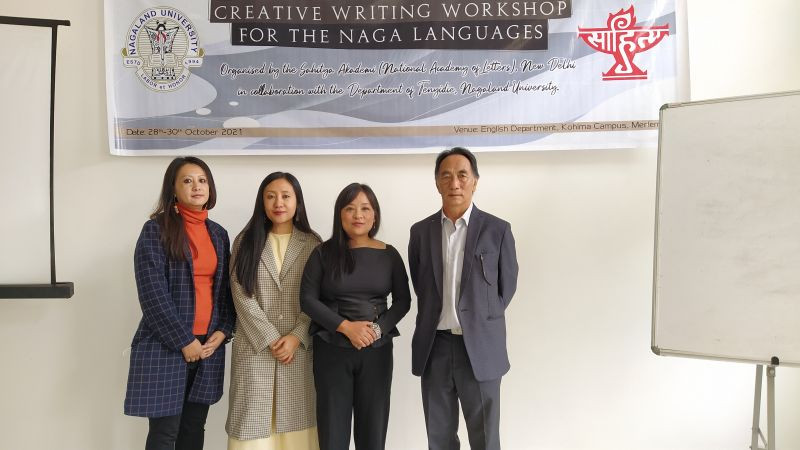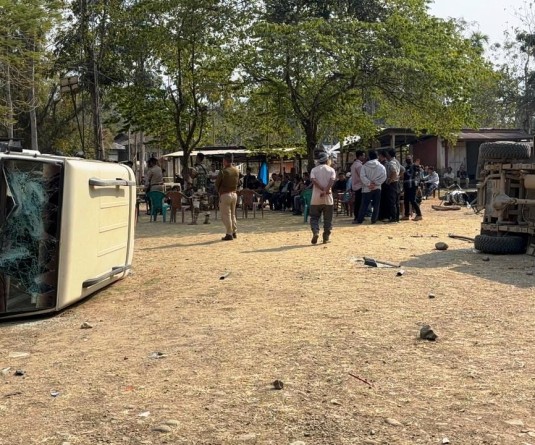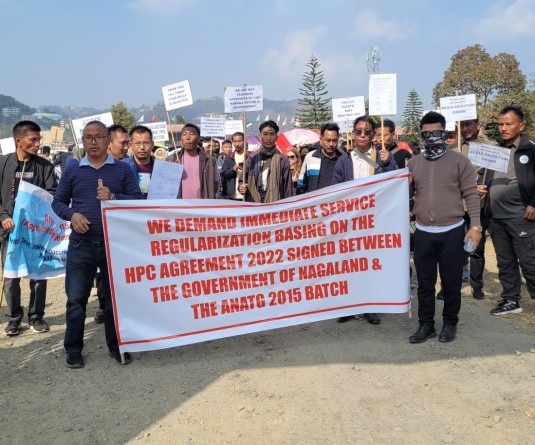(Left to right) Dr Kethokhrienuo Belho, Dr Adenuo Shirat Luikham, Dr Neikehienuo Mepfhu-o & Dr. D Kuolie.

Kohima, October 30 (MExN): For decades, indigenous people like Nagas have been ‘spoken for’ and ‘misrepresented’ by colonial anthropologists and historians, noted Dr Neikehienuo Mepfhu-o while observing that “emerging Naga writers seek to write and rewrite their own history and personal experiences and views instead of solely relying on history handed down to them by non-natives.”
Speaking on the topic “The non-fiction in fiction: Incorporating reality in fiction” on the concluding day of the three-day creative writing workshop for the Naga Languages at Nagaland University, she remarked that “this new generation of writers feel the necessity to preserve their authentic identity and experiences through its representation in literature.”
She stated belief that Naga writers are driven by their awareness of the power of literature as a dynamic tool in changing the attitudes of people, and added that, “today, through poems, novels, short stories, and even in dissertation writing, Nagas are exploring various aspects of their own culture and a society that is previously defined by labels and stereotypes.”
Regarding Naga literature, she observed that “there has been a lot of publications in the last few years but it is still at a nascent stage with the first novel published only in 2003.” It is with a conscious need and desire to rewrite history, she expressed “that some Naga writers started documenting their own personal stories and even the history of our people as reaction against misrepresentation and typecasting.”
In this regard, she made mention of writers like Temsula Ao, Easterine Kire, Monalisa Changkija, and Nini Lungalang who, she said, “initiated and brought Naga literature to where it is today – inspiring and opening avenues for other writers who will come after them.”
Dr Neikehienuo Mepfhu-o further related her own experience of writing her book on domestic violence titled- “My Mother’s Daughter” which earlier won the prestigious Gordon Graham Prize for Naga Literature in the fiction category. In the book, she said, stories of real victims were fictionalized to make it less obvious as some of the respondents were a bit wary of telling their stories for personal reasons.
To maintain anonymity of the respondents, she used “the literary technique of Nameless Characters in the book.” In incorporating real events and experiences in fiction, she pointed out that “there are some essential elements and narrative techniques that need to be considered.” “In fiction and nonfiction writing, verisimilitude is employed”, she explained in this regard.
She further dwelt on the qualities of empathy and understanding while writing but in the meantime, asserted that “one must also stay objective while writing a story based on real experiences.” One of the struggles in incorporating an actual event/experience in your fictional story, she said “is the actual events getting in the way of a good narrative.”
“It is important to write with willingness to change any part of the true story you are basing your narrative around. The true events should never cause you to compromise the fictional narrative,” she put across.
Two other sessions including “Indigenous Poetry: An Expedient Resource to Modern Poetic Creation” and “Fiction as Mirror to Society” were also conducted with Duovituo Kuolie and Sentilong Ozukum as resource persons. These two sessions were chaired by Theyiesinuo Keditsu and Kemtila Alinger respectively.
T Senka Ao, Recipient of Governor’s Award for Literature, 2016 was the chief guest for the valedictory programme during which certificates were also distributed to the participants. Dr Adenuo Shirat Luikham, Guest Faculty, Department of Tenyidie, Nagaland University chaired the programme while Dr Kethokhrienuo Belho, Asst. Professor, Department of Nagaland University proposed the vote of thanks.





